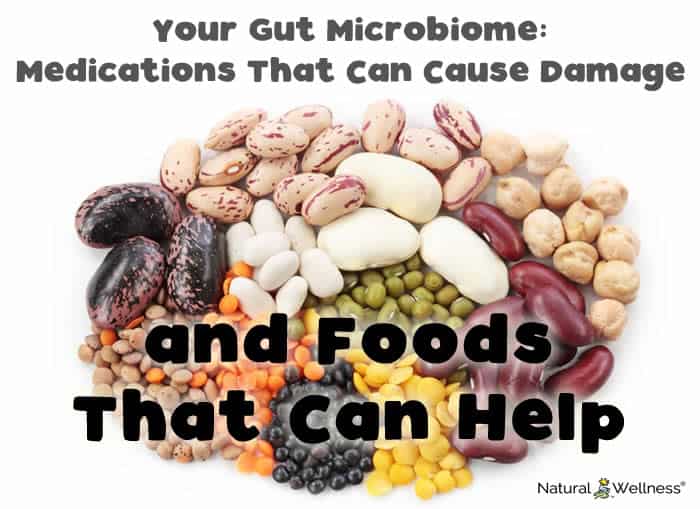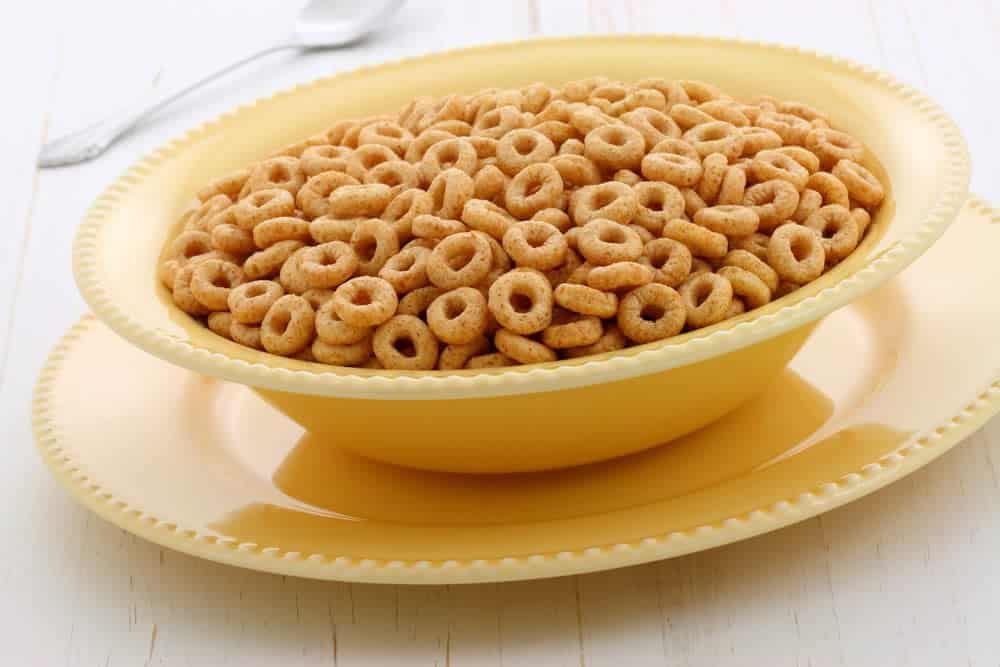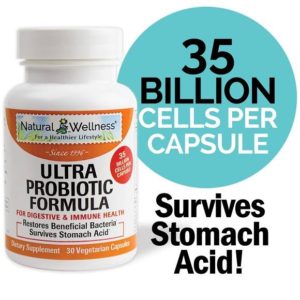

While the use of common medications has been linked to intestinal infections, obesity, and other serious conditions due to disruption of the gut microbiome, on the other hand, studies have shown certain foods can positively alter the microbiome.
What Is Your Gut Microbiome?
Your body’s microbiome is the network of trillions of microorganisms (also called microbiota or microbes), and it contains various species. You may have heard of having “good” bacteria in your system, but your microbiome can also contain fungi, parasites, and viruses. These microorganisms live peacefully amongst each other, mainly in your large and small intestine, but can also be found throughout the rest of your body. Your first exposure to microorganisms is as an infant at birth, and every person has a different microbiome structure originally determined by your DNA. (1)
The group of microbes that create your personal microbiome can be helpful, but also potentially harmful. Most of these microbes are symbiotic, which means that there is a mutually beneficial relationship between itself and the human body.
On a smaller scale, there are also microbes that are pathogenic, or disease promoting. Symbiotic and pathogenic microbes are able to coincide without problem in a healthy body. A term called dysbiosis occurs when the balance is thrown off by factors such as certain diets, infectious illnesses, or prolonged antibiotic use. With this microbial imbalance, the body may be more prone to disease. (1)
Benefits of Microbiota
With these trillions of microorganisms comes many health benefits! Microbes such as Bifidobacterium, Lactobacillus, and Clostridium are believed to block harmful bacteria from overgrowing in your system by competing for nutrients and attachment sites in the gut. They are also beneficial in breaking down complex carbohydrates, which are harder to digest compared to simple carbohydrates. Complex carbohydrates are found in foods such as whole grains, beans, and vegetables. When the microbes break down these foods along with their digestive enzymes, a fermentation process occurs with the fiber and creates short chain fatty acids (SCFAs). SCFA can be used by the body as a nutrient, but it can also prevent chronic disease and assist with muscle function. (1)
4 More Benefits of Microbiota
1. Stimulation of the immune system.
2. Production of certain vitamins and amino acids, such as vitamin K and B vitamins.
3. Protection from pathogens that enter your system from eating contaminated water or food.
4. They break down potentially toxic food compounds.
These compounds can be added to certain foods (think preservatives) or unknowingly created (a chemical reaction from cooking or processing foods).
Overall, ensuring your gut health is flourishing will help reduce risk of intestinal infections, obesity, and other serious conditions or disorders.
What Medications Affect the Microbiome?
Back in October, the United European Gastroenterology (UEG) Week 2019 (2) occurred, which provides a forum for scientists across the globe to introduce their latest research in digestive and liver diseases. One study presented found that 18 commonly used drug categories greatly affected the structure of the microbiome in the gut.
The drug categories that had the biggest impact include:
- Proton pump inhibitors (PPI’s): Commonly prescribed medication for treatment of heartburn or acid-related disorders, such as GERD (Gastroesophageal Reflux Disease)
- Metformin: Type 2 Diabetes treatment
- Antibiotics: Bacterial infection treatment
- Laxatives: Constipation prevention and treatment
The study found that individuals using PPI’s had a higher amount of “bad” bacteria in the upper gastrointestinal tract, while Metformin users had a higher level of potentially harmful Escherichia coli (E. Coli).
Similar studies have shown that antibiotics alter the composition of the gut microbiome, and oftentimes it doesn’t return back to its normal state even after antibiotic treatment has stopped. Overuse of antibiotics can also create resistant bacteria, which makes it more difficult to control and treat bacterial infections. (3)
What Foods Benefit the Microbiome?

Following a generally healthy eating pattern can be beneficial in many aspects when it comes to your health and wellness, including your gut microbiome. With all the great benefits that can come from having a healthy microbiome, many studies have been done in order to understand how to modify these microbiota.
Another study that was presented at UEG Week 2019 (4) evaluated 4 groups of people:
- the general population
- groups suffering from Crohn’s disease
- groups suffering from irritable bowel syndrome (IBS)
- groups suffering from ulcerative colitis.
Their individual gut microbiomes were examined using stool samples.
Here is what was found:
- Diets rich in bread, legumes, fish, and nuts decreased harmful bacteria and lowered markers that are linked with intestinal inflammation.
- Red wine, legumes, vegetables, fruit, cereals, fish, and nuts were associated with a higher amount of anti-inflammatory bacteria.
- Plant-based diets correlated with high levels of bacteria short-chain fatty acid (SCFA) production, which is the main source of energy for cells that line the colon.
- Plant protein assisted with the production of vitamins and amino acids, along with breaking down sugar alcohols and ammonium excretion.
These foods are commonly found in the Mediterranean diet, which is highly regarded as a healthy balanced diet. Several other studies have shown that this diet can also improve obesity, cholesterol, and triglyceride levels.
On the flip side, it was found that diets higher in meat, fast food, and refined sugar decreased beneficial bacteria performance and increased inflammatory markers, which rise during intestinal inflammation.
The Role of Probiotics
Probiotics contain live active bacteria that can come from either food or supplements. Fermented foods such as yogurt with live active cultures, sauerkraut, and kombucha contain these microorganisms, which may help intestinal health and possibly treat or prevent inflammatory bowel disease (IBD).
A study published in Mediators of Inflammation (5) evaluated 60 healthy adults who were given probiotics containing three strains of Bifidobacteria, four strains of Lactobacilli, and one strain of Streptococcus. After 6 weeks, it was found that participants taking the probiotic showed a considerable increase in the concentration of these “good” bacteria.
Similar strains mentioned in the study can be found in Natural Wellness’s Ultra Probiotic Formula.
In Conclusion
Impressive to think a group of tiny microorganisms living in our body can have such a big impact on our health!
 If you’re concerned because you are currently taking a medication that has been discussed, please make sure to have a conversation with your doctor or healthcare provider before discontinuing or making any drastic changes.
If you’re concerned because you are currently taking a medication that has been discussed, please make sure to have a conversation with your doctor or healthcare provider before discontinuing or making any drastic changes.
If you’re also worried because you see very few foods that you enjoy on the list that can aid your gut microbiome, consider trying Ultra Probiotic Formula to help it thrive!




